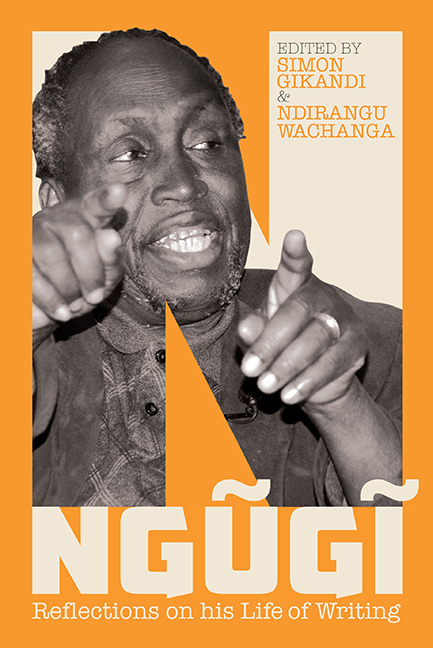Book contents
- Frontmatter
- Contents
- Preface
- Acknowledgements
- Chronology
- Photographic Section
- Introduction: Ngũgĩ wa Thiong'o: Reflections on His Life of Writing
- Ngũgĩ at Work
- Part I Serenades & Beginnings
- Part II Memories, Recollections & Tributes
- 10 Remembering Early Conversations with Ngũgĩ
- 11 Ngũgĩ wa Thiong'o at 80: Pongezi (Congratulations!)
- 12 Ngũgĩ wa Thiong'o at 80: Inspiring Encounters
- 13 Ngũgĩ in the 1970s at the University of Nairobi
- 14 ‘Professor, You are in Ngũgĩ's Book’
- 15 Mũraata, Mũrutani, na Mũthikĩrĩria (Friend, Teacher & Listener)
- 16 Fear & Trepidation in Asmara: Meeting Ngũgĩ
- 17 Ngũgĩ wa Thiong'o: A True Story
- 18 Ngũgĩ wa Thiong'o: Tribute on His 80th Birthday
- Part III Working with Ngũgĩ
- Part IV The Writer, the Critic & the World
- Part V The Other Ngũgĩ
- Appendixes
- References
- Bibliography of Ngũgĩ's Primary Works
- Works Cited
- Notes on Contributors
- Index
15 - Mũraata, Mũrutani, na Mũthikĩrĩria (Friend, Teacher & Listener)
from Part II - Memories, Recollections & Tributes
Published online by Cambridge University Press: 27 July 2019
- Frontmatter
- Contents
- Preface
- Acknowledgements
- Chronology
- Photographic Section
- Introduction: Ngũgĩ wa Thiong'o: Reflections on His Life of Writing
- Ngũgĩ at Work
- Part I Serenades & Beginnings
- Part II Memories, Recollections & Tributes
- 10 Remembering Early Conversations with Ngũgĩ
- 11 Ngũgĩ wa Thiong'o at 80: Pongezi (Congratulations!)
- 12 Ngũgĩ wa Thiong'o at 80: Inspiring Encounters
- 13 Ngũgĩ in the 1970s at the University of Nairobi
- 14 ‘Professor, You are in Ngũgĩ's Book’
- 15 Mũraata, Mũrutani, na Mũthikĩrĩria (Friend, Teacher & Listener)
- 16 Fear & Trepidation in Asmara: Meeting Ngũgĩ
- 17 Ngũgĩ wa Thiong'o: A True Story
- 18 Ngũgĩ wa Thiong'o: Tribute on His 80th Birthday
- Part III Working with Ngũgĩ
- Part IV The Writer, the Critic & the World
- Part V The Other Ngũgĩ
- Appendixes
- References
- Bibliography of Ngũgĩ's Primary Works
- Works Cited
- Notes on Contributors
- Index
Summary
I have enjoyed being in the classroom again after more than six years. Seminars can be very stimulating although very demanding. The students with their passionate debates, quarrels, shoutings, and arguments make me feel at home, and I begin looking forward to every seminar. But, of course, I am daily struck by the absurdity of the situation. In my own country I was banned from teaching at the university, or in any school. (Ngũgĩ wa Thiong'o, ‘Life, Literature and a Longing for Home’ 5)
When Ngũgĩ wa Thiong'o and I became friends, he had recently arrived as a visiting professor at Yale University. A few weeks later at a time when I was traumatized and distraught, he helped me through a very difficult period by listening, by asking thoughtful questions, by providing sensible advice, and by making me laugh. An advisee and Kiswahili teaching assistant I had recruited to Yale had murdered his former fiancee and killed himself. Then a newspaper report claimed that this happened because of a violent African language cult at Yale where I was the Director of the Program in African Languages. The Dean of Yale College decided to investigate these absurd charges, although his secretary called it ‘just a routine program review’. One afternoon, shortly after we first met, Ngũgĩ stopped by the Yale Program in African Languages office and overheard me on the phone talking with a reporter and telling him his questions were racist and ethnocentric. Ngũgĩ suggested that he answer the phone for me for a while and I listened while he calmly and patiently explained to the reporter that studying African languages was a worthwhile intellectual practice and not a bizarre or threatening activity. I relaxed and laughed for the first time in a while, and I began learning about Ngũgĩ's skills in effective listening, his kindness, and his generosity.
Later over dinner, and the first of what became over a quite a few excellent meals at a wide range of downtown New Haven restaurants, Ngũgĩ listened while I talked about what had happened.
- Type
- Chapter
- Information
- NgugiReflections on his Life of Writing, pp. 86 - 90Publisher: Boydell & BrewerPrint publication year: 2018



